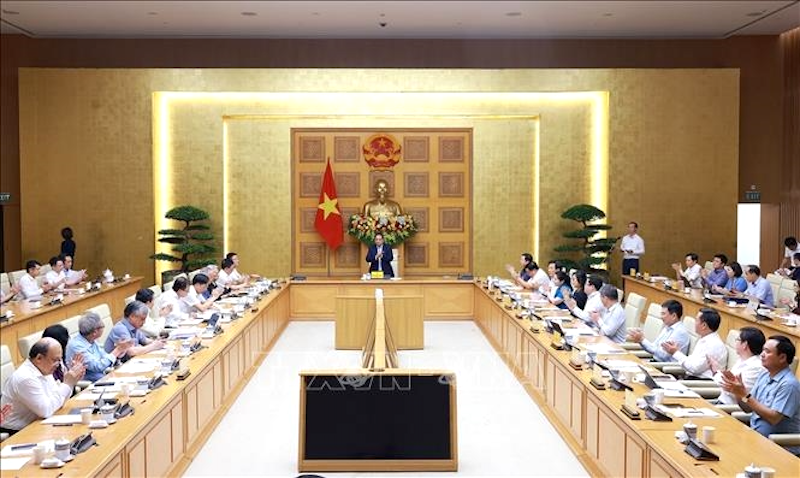Vietnam accelerates private sector reform under new policy directive
Prime Minister Pham Minh Chinh requested draft special mechanisms that encourage all contributors, including households and individuals.
THE HANOI TIMES — Vietnam is preparing a bold policy shift to transform its private sector into a dynamic engine of growth, with Prime Minister Pham Minh Chinh directing the Advisory Council for Policy Reform to urgently finalize a draft resolution in line with Politburo Resolution No. 68, issued on May 4, 2025.
At a working session with the council on May 8, Chinh emphasized the need to gather input from government members, provincial and municipal leaders, business associations, and the broader business community.
The final draft must be submitted to the National Assembly by May 12 for review and approval by May 18.

Prime Minister Pham Minh Chinh chairs a meeting with the Advisory Council for Policy Reform on private sector development. Photo: Vietnam News Agency
The prime minister stressed the urgency of institutionalizing the Politburo's directive by developing a resolution, including issues not yet addressed by current legislation, to accelerate sustainable and rapid private sector growth.
According to Chinh, the proposed mechanisms and policies must serve as both leverage and foundation, closely tailored to the current socio-economic context. They should inspire confidence, foster self-reliance and encourage innovation, while effectively utilizing all available resources to create jobs, support livelihoods, and boost production.
The prime minister reiterated the vital role of the private sector as a key driver of the national economy. Therefore, he urged strong policies to ignite a nationwide movement to develop private enterprises, households, and individuals.
The policies aim to help home-based businesses formalize their operations, support micro and small enterprises in scaling up into key economic players, and enable large private groups to integrate into global supply chains and expand into multinational corporations.
He also called for a thorough review of current regulations to ensure freedom of enterprise, equal market access, fair competition and equitable access to capital, land and public assets, and promote public-private partnerships.
Chinh said workforce training policies must be closely synchronized with market demands, requiring closer cooperation between enterprises and educational institutions.
As part of efforts to create a secure and predictable investment climate, the prime minister stressed the importance of clarifying legal responsibilities in accordance with Resolution No. 68.
He stressed the need for a clear distinction between criminal, administrative and civil responsibilities, saying it's essential to foster the confidence of businesses and entrepreneurs.
To further support the private sector, Chinh suggested that the upcoming National Assembly resolution include credit guarantee mechanisms for small and medium-sized enterprises.
It also encouraged the development of private investment funds and advocated streamlined administrative procedures for business registration, dissolution, and tax payment.
The draft resolution to be submitted to the National Assembly is divided into three groups: urgent measures requiring immediate action that are not covered by the current legal framework; tasks governed by existing laws that require immediate amendments; and long-term strategic solutions that need further study before future legislative consideration.












